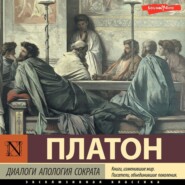По всем вопросам обращайтесь на: info@litportal.ru
(©) 2003-2024.
✖
Sophist
Настройки чтения
Размер шрифта
Высота строк
Поля
THEAETETUS: Of what are you speaking? You clearly think that we must first investigate what people mean by the word 'being.'
STRANGER: You follow close at my heels, Theaetetus. For the right method, I conceive, will be to call into our presence the dualistic philosophers and to interrogate them. 'Come,' we will say, 'Ye, who affirm that hot and cold or any other two principles are the universe, what is this term which you apply to both of them, and what do you mean when you say that both and each of them "are"? How are we to understand the word "are"? Upon your view, are we to suppose that there is a third principle over and above the other two, – three in all, and not two? For clearly you cannot say that one of the two principles is being, and yet attribute being equally to both of them; for, if you did, whichever of the two is identified with being, will comprehend the other; and so they will be one and not two.'
THEAETETUS: Very true.
STRANGER: But perhaps you mean to give the name of 'being' to both of them together?
THEAETETUS: Quite likely.
STRANGER: 'Then, friends,' we shall reply to them, 'the answer is plainly that the two will still be resolved into one.'
THEAETETUS: Most true.
STRANGER: 'Since, then, we are in a difficulty, please to tell us what you mean, when you speak of being; for there can be no doubt that you always from the first understood your own meaning, whereas we once thought that we understood you, but now we are in a great strait. Please to begin by explaining this matter to us, and let us no longer fancy that we understand you, when we entirely misunderstand you.' There will be no impropriety in our demanding an answer to this question, either of the dualists or of the pluralists?
THEAETETUS: Certainly not.
STRANGER: And what about the assertors of the oneness of the all – must we not endeavour to ascertain from them what they mean by 'being'?
THEAETETUS: By all means.
STRANGER: Then let them answer this question: One, you say, alone is? 'Yes,' they will reply.
THEAETETUS: True.
STRANGER: And there is something which you call 'being'?
THEAETETUS: 'Yes.'
STRANGER: And is being the same as one, and do you apply two names to the same thing?
THEAETETUS: What will be their answer, Stranger?
STRANGER: It is clear, Theaetetus, that he who asserts the unity of being will find a difficulty in answering this or any other question.
THEAETETUS: Why so?
STRANGER: To admit of two names, and to affirm that there is nothing but unity, is surely ridiculous?
THEAETETUS: Certainly.
STRANGER: And equally irrational to admit that a name is anything?
THEAETETUS: How so?
STRANGER: To distinguish the name from the thing, implies duality.
THEAETETUS: Yes.
STRANGER: And yet he who identifies the name with the thing will be compelled to say that it is the name of nothing, or if he says that it is the name of something, even then the name will only be the name of a name, and of nothing else.
THEAETETUS: True.
STRANGER: And the one will turn out to be only one of one, and being absolute unity, will represent a mere name.
THEAETETUS: Certainly.
STRANGER: And would they say that the whole is other than the one that is, or the same with it?
THEAETETUS: To be sure they would, and they actually say so.
STRANGER: If being is a whole, as Parmenides sings, —
'Every way like unto the fullness of a well-rounded sphere, Evenly balanced from the centre on every side, And must needs be neither greater nor less in any way, Neither on this side nor on that – '
then being has a centre and extremes, and, having these, must also have parts.
THEAETETUS: True.
STRANGER: Yet that which has parts may have the attribute of unity in all the parts, and in this way being all and a whole, may be one?
THEAETETUS: Certainly.
STRANGER: But that of which this is the condition cannot be absolute unity?
THEAETETUS: Why not?
STRANGER: Because, according to right reason, that which is truly one must be affirmed to be absolutely indivisible.
THEAETETUS: Certainly.
STRANGER: But this indivisible, if made up of many parts, will contradict reason.
THEAETETUS: I understand.
STRANGER: Shall we say that being is one and a whole, because it has the attribute of unity? Or shall we say that being is not a whole at all?
THEAETETUS: That is a hard alternative to offer.
STRANGER: Most true; for being, having in a certain sense the attribute of one, is yet proved not to be the same as one, and the all is therefore more than one.
THEAETETUS: Yes.
STRANGER: And yet if being be not a whole, through having the attribute of unity, and there be such a thing as an absolute whole, being lacks something of its own nature?
THEAETETUS: Certainly.
STRANGER: Upon this view, again, being, having a defect of being, will become not-being?

















